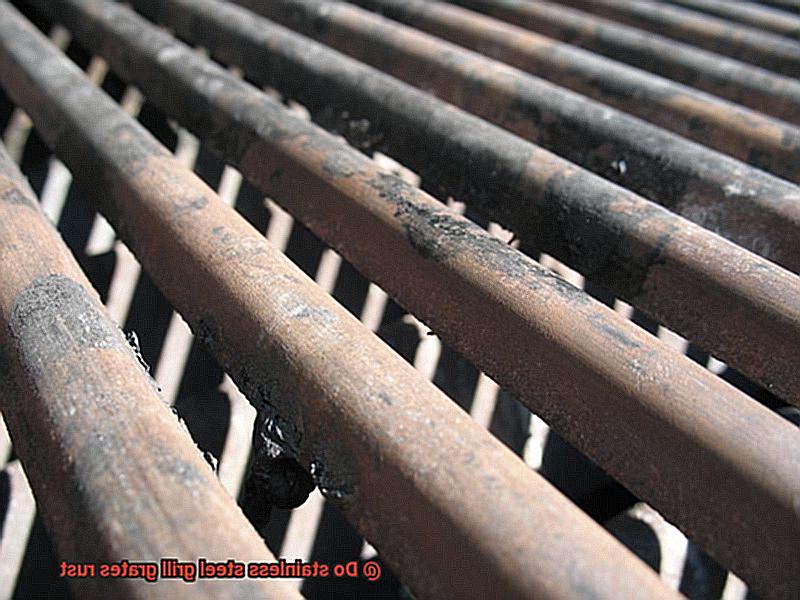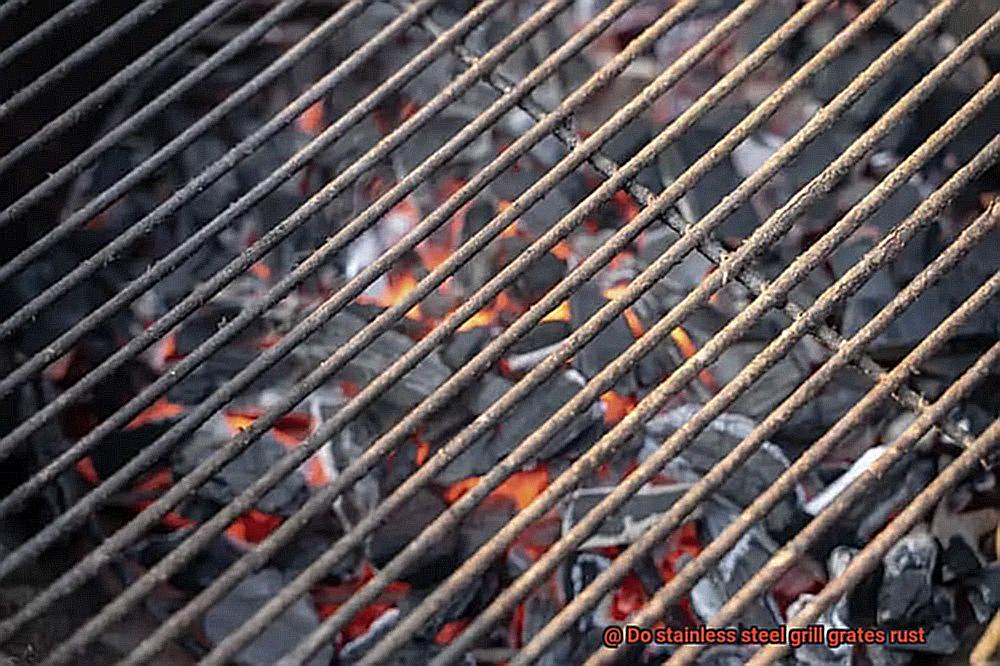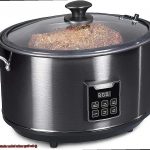Do you love nothing more than firing up the grill and cooking up a storm outdoors? If so, you’re probably familiar with the importance of investing in high-quality equipment that can stand up to the elements and keep your meals tasting delicious. Stainless steel grills are a popular choice for many outdoor cooking enthusiasts, thanks to their durability and ease of maintenance.
But what about stainless steel grill grates? Are they really as rust-resistant as they claim to be? The truth is, while stainless steel is known for its ability to resist corrosion and heat damage, it’s not completely impervious to rust. Over time, exposure to moisture, high temperatures, and other environmental factors can cause stainless steel grill grates to become discolored or even start to rust.

In this blog post, we’ll dive deeper into the question of whether stainless steel grill grates really do rust, and explore some of the common causes behind this phenomenon. We’ll also share some tips on how you can prevent or remove rust from your grill grates, so you can keep enjoying perfectly grilled meals for years to come.
Whether you’re a seasoned grill master or just starting out on your outdoor cooking journey, this post has everything you need to know about keeping your stainless steel grill grates in tip-top condition. So sit back, relax, and get ready to learn all about one of the most important components of your outdoor kitchen setup.
Contents
Can Stainless Steel Grill Grates Rust?
Stainless steel is renowned for its durability and resistance to rust; however, even high-quality stainless steel grill grates can still rust under certain conditions. Factors such as exposure to moisture, high levels of chlorine or salt in the air, and exposure to acidic marinades or sauces can all contribute to the formation of rust.
To keep your stainless steel grill grates free from rust, it’s essential to keep them clean and dry. After each use, allow the grates to cool down before using a grill brush to remove any leftover food particles or debris. It’s also recommended to clean your grates with mild detergent and warm water regularly. Make sure to rinse them thoroughly and dry them completely before storing them away.
Another way to protect your stainless steel grill grates from rust is by seasoning them with oil. This process involves coating the grates with a thin layer of oil and then heating them up on the grill for a period of time. The heat helps create a protective barrier that prevents moisture from penetrating the surface of the metal.
It’s also crucial to choose high-quality stainless steel grill grates that are specifically designed for outdoor use. Look for grates made from 304-grade stainless steel, which is more resistant to rust than other types of stainless steel.
If rust does start to form on your stainless steel grill grates, it’s essential to address it as soon as possible. Using a wire brush or sandpaper can help remove the rust, followed by applying a rust inhibitor or stainless steel polish to protect the grates from further damage.
Causes of Rust on Stainless Steel Grill Grates
We all know that stainless steel is a durable material that’s resistant to rust and corrosion, but it can still fall prey to these issues if not properly cared for. Here are the main culprits behind rust formation on your grill grates:
Moisture is one of the primary causes of rust on stainless steel grill grates. When water or other liquids come into contact with the metal, they create a corrosive environment that promotes rust formation. This can happen if you leave your grill outside during rainy or humid weather or fail to dry it off after cleaning.
Acidic substances are another common cause of rust on stainless steel grill grates. Foods like citrus fruits, tomatoes, and vinegar are all acidic and can eat away at the protective layer on the surface of the metal. As a result, pitting and rust formation can occur over time.
Improper cleaning and maintenance also contribute to rust formation on your grill grates. Using abrasive cleaners or tools can scratch the surface of the metal, making it more susceptible to rust and corrosion. Failing to clean your grates regularly allows food particles and grease to build up, creating a breeding ground for bacteria and other harmful substances.
To prevent rust from forming on your stainless steel grill grates, proper care and maintenance are key. Start by cleaning your grates regularly with a mild detergent and warm water, avoiding abrasive cleaners and tools that can damage the surface. Make sure to dry them thoroughly after each use to prevent moisture from accumulating.
Tips to Prevent Rust on Stainless Steel Grill Grates
Even the highest quality stainless steel grill grates can eventually succumb to rust if not properly taken care of. Rust on grill grates not only affects the appearance of your grill but can also negatively impact the flavor of your food. Here are five sub-sections with tips on how to prevent rust on stainless steel grill grates:
Keep Them Clean and Dry
To prevent rust from forming on your stainless steel grill grates, it is essential to keep them clean and dry. After each use, use a wire brush or scraper to remove any leftover food debris from the grates.
Then, wipe them down with a damp cloth or paper towel to remove any remaining grease or oil. It is also crucial to keep your grill grates dry. Moisture is one of the biggest culprits when it comes to rust formation.
After cleaning your grates, allow them to fully air dry before storing them away. If you need to store your grill outdoors, consider investing in a cover that will protect it from rain, snow, and other weather elements.
Season Your Grill Grates
Another way to prevent rust on your stainless steel grill grates is by seasoning them regularly. Seasoning involves applying a layer of oil to the grates and heating them up on high heat for several minutes. This process creates a non-stick surface that prevents food from sticking while also protecting the metal from rust.
Oil Them Regularly
Brushing a thin layer of vegetable or canola oil onto the grates before each use can act as a barrier between the metal and any moisture or acidic substances that may come into contact with the grates during cooking. This helps prevent rust from forming.
Use Stainless Steel Cleaner
Avoid using harsh chemicals or abrasive scrubbers when cleaning your stainless steel grill grates. These can scratch the surface of the metal and create opportunities for rust formation. Stick to mild dish soap and warm water or specialized grill cleaning products that are designed specifically for stainless steel surfaces. Using a stainless steel cleaner can help remove any stubborn stains or residue from the surface of stainless steel. They also leave behind a protective layer that helps prevent rust formation.
Store Them in a Dry Place
Lastly, storing grill grates in a dry place can also help prevent rust. If possible, store them indoors or in a covered area to protect them from moisture and humidity. If you need to store them outside, make sure they are well covered and protected from the elements.
How to Remove Rust from Stainless Steel Grill Grates
Stainless steel grill grates are a popular choice for their durability and rust-resistant properties, but even they can succumb to rust if not maintained properly. Fortunately, removing rust from stainless steel grill grates is a straightforward process that can be accomplished using household items or commercial rust removers. Here are five sub-sections explaining how to remove rust from stainless steel grill grates.
Thoroughly Clean the Grates
Before attempting to remove rust from your grill grates, it’s essential to clean them thoroughly with a grill brush or scraper to remove any debris or food particles stuck on them. This will help ensure that the rust removal process is effective and efficient.
Use Baking Soda and Water
One effective method of removing rust from stainless steel grill grates is by creating a paste using baking soda and water. Apply the paste directly to the rust spots, let it sit for several hours or overnight, then scrub it off with a stiff brush or steel wool. The baking soda helps to break down the rust and make it easier to remove.
Soak in Vinegar
Soaking the grill grates in white vinegar is another effective way of removing rust. Simply submerge the grates in vinegar for several hours or overnight, then scrub them clean with a brush or steel wool. The acidity of the vinegar helps dissolve the rust and make it easier to remove.
Use a Commercial Rust Remover
If the rust is particularly stubborn, you may need to use a commercial rust remover. These products are available at most hardware stores and come in spray or liquid form. It’s crucial to follow the manufacturer’s instructions carefully and wear gloves and eye protection when using these products.
Rinse and Dry Thoroughly
After removing the rust, rinse the grates with water and dry them completely before using them again. Any leftover residue from the cleaning process can cause new rust to form, so it’s crucial to ensure that the grates are completely dry. You may also want to oil the grates lightly to provide a layer of protection against moisture and prevent future rusting.
Benefits of Using Stainless Steel Grill Grates
Not only are they durable, but they offer a range of benefits that make them a top choice among grill enthusiasts.
One of the primary advantages of using stainless steel grill grates is their resistance to rust and corrosion. The chromium in the steel creates a protective layer on the surface that prevents rust from forming. This means that you can spend more time grilling and less time worrying about maintenance.
Stainless steel grill grates are also incredibly durable and can withstand high temperatures and heavy use. Unlike other materials, they can last for many years with proper maintenance, making them a cost-effective investment in the long run.
Stainless steel grill grates are also easy to clean. Unlike cast iron grates that require special care and seasoning, stainless steel grates can be cleaned with soap and water or a grill brush. This convenience allows you to spend more time doing what you love – grilling up delicious meals for your family and friends.
In addition to their rust-resistant and durable qualities, stainless steel grill grates provide an even cooking surface. Heat is distributed evenly across the food, preventing hot spots and ensuring that your food is cooked thoroughly and evenly. Plus, stainless steel grill grates do not retain as much heat as cast iron grates, making it easier to control the temperature of your grill.
Disadvantages of Using Stainless Steel Grill Grates
When it comes to outdoor cooking, stainless steel grill grates are a popular choice for their durability and rust resistance. However, like all things, they do have some downsides that should be taken into consideration before making a purchase.
Firstly, let’s talk about cost. Stainless steel grates tend to be pricier than other materials such as cast iron or porcelain-coated grates. This may not be an issue for those who prioritize longevity and durability, but for those on a tight budget, it could be a dealbreaker.
Cleaning stainless steel grill grates can also be a bit of a hassle. While they are resistant to rust, they can still become stained and discolored over time due to exposure to heat and smoke. This requires extra effort to keep them looking clean and new.
Another factor to consider is heat retention capacity. Stainless steel grates don’t hold heat as well as cast iron, which can result in uneven cooking and affect the flavor of your food. Additionally, stainless steel grill grates can warp or bend over time from exposure to high heat, which can impact their performance.
Finally, stainless steel grill grates may not provide as much flavor as other materials. Cast iron grates are known for imparting a desirable smoky flavor to food that stainless steel grates simply can’t match.
Alternatives to Stainless Steel Grill Grates
If you’re in the market for an alternative to stainless steel grill grates, you’ve come to the right place. As an expert in the field, I’ve delved into the world of grill grate options to provide you with a comprehensive list of alternatives.
First up, we have cast iron grill grates. These grates are perfect for those looking to create a beautiful sear on their food and retain heat exceptionally well. However, they require more maintenance than stainless steel and may rust if not properly cared for.
Next, we have porcelain-coated grill grates. These grates are coated with a layer of porcelain that helps prevent rust and makes cleaning a breeze. While these grates are durable, they can chip or crack over time, exposing the metal underneath.
For those seeking something new, ceramic grill grates are an excellent option. These grates offer superior heat distribution and retention and impart a unique flavor profile on your food due to their porous surface. However, they can be quite expensive compared to other options and may crack or break if dropped.
If you’re a fan of stainless steel but worried about rusting, consider using stainless steel mesh grill grates. These grates have smaller holes than traditional stainless steel grates, which helps prevent food from falling through while also reducing the risk of rusting.
Finally, we have aluminum grill grates. These grates are lightweight and easy to clean, making them ideal for those who prioritize ease of maintenance. However, they may not be as durable as other options and can warp or bend over time.
pDpy5Wb7glo” >
Also Read: How to Keep Weber Grill from Rusting
Conclusion
In conclusion, stainless steel grill grates are a top choice for outdoor cooking enthusiasts due to their durability and low maintenance requirements. While they may be resistant to rust, it’s important to note that even high-quality stainless steel grill grates can still succumb to corrosion under certain conditions. Factors such as moisture exposure, high chlorine or salt levels in the air, and acidic marinades or sauces can all contribute to rust formation.
To keep your stainless steel grill grates rust-free, proper care and maintenance are essential. This includes cleaning and drying them after each use, seasoning them with oil, using mild detergent and warm water for cleaning, selecting high-quality stainless steel grill grates made specifically for outdoor use, and storing them in a dry place.
If you do notice rust forming on your stainless steel grill grates, it’s crucial to address the issue promptly. There are various methods for removing rust from grill grates including using baking soda and water or soaking them in vinegar.
While stainless steel grill grates offer many benefits such as resistance to corrosion and easy cleaning; there are some drawbacks such as cost and difficulty retaining heat compared to cast iron grates which could impact the taste of food cooked on them. Other alternatives include cast iron grates which retain heat well but require more upkeep than stainless steel; porcelain-coated which is durable but can chip or crack over time; ceramic which offers superior heat distribution but is expensive; aluminum which is lightweight but may not be as sturdy as other options; and finally stainless steel mesh which has smaller holes than traditional grates reducing the risk of rusting.
Ultimately, choosing the right type of grill grate depends on your specific needs and preferences.






